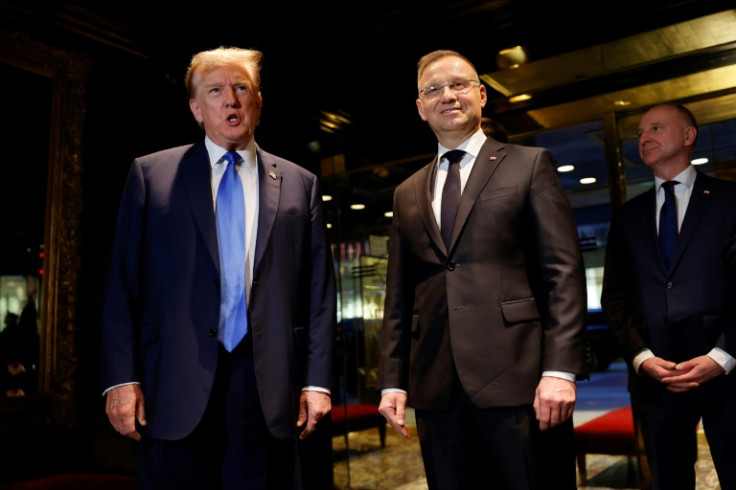Trump, In Shadow Diplomacy, Seeks To Be Anti-Biden

Receiving dignitaries at his Florida estate and courting leaders shunned elsewhere as autocratic, Donald Trump is increasingly leading a shadow diplomacy diametrically opposed to US President Joe Biden.
The Republican mogul, in the unusual role of a former president running again for the top job, has turned to trusted faces both at home and abroad and sought to scuttle some of Biden's top foreign policy priorities.
Trump's supporters have for months held up billions of dollars in military aid to Ukraine, which the president has vowed to defend, and Trump has insisted that Biden's "weaknesses" encouraged Iran to launch its major attack on Israel.
Polish President Andrzej Duda, a conservative who has described the European Union as "an imaginary community from which we don't gain much," met with the White House hopeful Wednesday at his Trump Tower in Manhattan.
"He's done a fantastic job and he's my friend, and we had four great years together" when the two were president at the same time, Trump said, standing alongside Duda in a video clip posted on Trump's Truth Social account.
"We may have to do it again."
British Foreign Secretary David Cameron, a former prime minister who had once denounced Trump as "protectionist, xenophobic, misogynistic," recently made the trek to the Republican's Mar-a-Lago home to dine with him and make the case on helping Ukraine.
Cameron was an unusually traditional character to see Trump. In March, Trump received Hungarian Prime Minister Viktor Orban, an avowed nationalist who has long thumbed his nose at the European Union on issues dear to the American such as migration.
Speaking afterward on CNBC, Trump praised Orban as a "tough man" and for his "wonderful statement" that "we will solve the problems of the world if Donald Trump comes back."
A potential Trump return has caused unease among many traditional political leaders in US allies. Earlier this year Trump warned of siding with Russia over NATO allies who "don't pay (their) bills," a reference to defense spending targets.
Trump said he would "encourage" Russia to "do whatever the hell they want" to countries that do not pay. NATO considers an attack on one ally an attack on all 32.
Brian Finucane, who watches US foreign policy for the International Crisis Group, said it was likely -- but not certain -- that Trump would not support military aid to Ukraine and that he would hold off on pressuring Israel.
Trump's statements have been along the lines of "It wouldn't happen on my watch, and if I were president, I would solve it immediately," Finucane said.
"But he's pretty light on the details," he said.
"It would depend on the foreign policy team he has around him. And there again, there is a higher uncertainty because there seems to be divisions within the GOP foreign policy community" between traditional hawks and those who favor less international involvement, he said.
Among the most prominent foreign policy figures in Trump's orbit is Rick Grenell, known for his coarse exchanges with journalists over social media and his open embrace of figures generally shunned by the United States.
Trump allies frequently speak of Grenell as a secretary of state. During Trump's 2017-2021 term, Grenell served as ambassador to Germany -- where he took to social media to cheer on European nationalists -- and as acting director of national intelligence.
While out of power, Grenell -- who also served as Trump's Balkans envoy -- has met Serbian President Aleksander Vucic, who has cordial relations with the Biden administration but not the friendly embrace of Trump's team.
Trump's son-in-law Jared Kushner has moved to do business in Serbia, including with plans to build luxury real estate at the site of the former Yugoslav army headquarters destroyed in 1999 NATO strikes during the Kosovo war.
Kushner, a family friend of Israeli Prime Minister Benjamin Netanyahu who led Trump's Middle East policy, has also drawn scrutiny after leaving office for starting a private equity firm that received a reported $2 billion from a fund controlled by Saudi Crown Prince Mohammed bin Salman.
The Trump administration had steadfastly defended the de facto ruler of the kingdom, who US intelligence say ordered the brutal killing of US-based dissident writer Jamal Khashoggi.
Trump's campaign declined comment to AFP.
Grenell, speaking to the conservative gathering CPAC in February, said business deals were integral to their strategy.
"Part of our foreign policy is to avoid the political talk and figure out ways to do greater trade that is going to make us more safe," Grenell said.
He made no apologies for his abrasive reputation.
"You better have an SOB diplomat if you want to avoid war."

© Copyright AFP 2024. All rights reserved.











